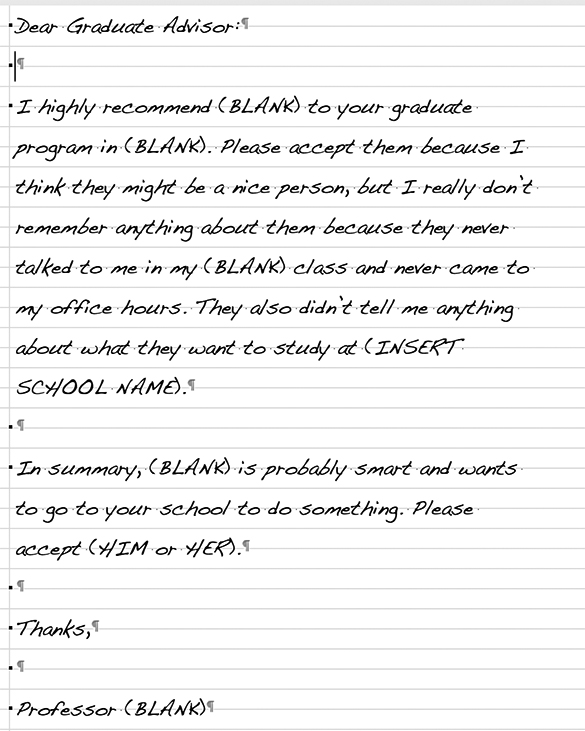So, You Want a Letter of Recommendation...

Professors routinely get requests to write letters of recommendations from current and former students for such things as graduate school applications, scholarships, grants, and job applications. Letters of recommendation are not easy to write...well, at least good ones are not. One of the most frustrating parts of writing these letters is that students do not provide enough information to help the professor write a good letter. Therefore, if you would like a faculty member to write you a letter, please read this first! Some of the information on this page is borrowed and modified from a checklist from the Art History program at Texas Tech University.
Graduate programs—especially the top ones—are extremely selective, and grants and scholarships become more competitive each year. Beyond grades, possibly your GRE score, and your statement, strong letters of support are extremely important. A generic letter of recommendation is immediately recognizable by readers on admission committees and grant selection committees and is, frankly, the kiss of death. A letter of recommendation is unique—it describes accurately your strengths and skills and is tailored to the program to which you are applying. It is also well crafted and convincing. A strong letter of recommendation, in fact, can offset an area of perceived weakness in your application (low GPA, poor GRE score, etc.).
Information Your Letter Writers Need
To write a good letter, the letter writer must have as much information about you as possible. For graduate school applications, this includes information about your career goals, any professional experience you have, the field and sub-fields that interest you, your personal strengths, and of course, your college career. For grants, this includes a copy of everything you are submitting to the granting agency as part of your application.
- A list of the names of the specific programs and schools (or grant agencies) to which you are applying, with deadlines and addresses (including the name of person or committee to whom the letter should be addressed) and any required forms. Provide links to the appropriate program website(s). Indicate if the letter should be sent to the school(s), if you will pick it up, or if it should be submitted online.
- The due date for the letter(s)
- Your letter of application or statement of purpose (that you will send out to the school; one will usually suffice)
- An updated CV
- Your transcript (can be a copy, does not have to be "official")
- A list of the courses you took with the letter writer, indicating paper topic(s), paper grade(s), and your final grade(s), and
- Your major, your minor, and your long-term career goals.
Ask Early!
To allow your letter writer to fit your letters of recommendation into his or her existing work schedule, please request a letter (first) and then (if the professor agrees to write a letter) provide the information listed above two to four weeks before the first due date, depending on the time of year (Thanksgiving, Christmas, and other holidays should be factored into the above time.) Requests for letters with less than two weeks' notice tend not to be entertained, so plan ahead, particularly during the summer and over the holidays.
Sociology, Anthropology, and Social Work
-
Address
Holden Hall 158, Box 41012, 1011 Boston Ave., Lubbock, TX 79409 -
Phone
806.742.2400 -
Email
athena.baumann@ttu.edu
